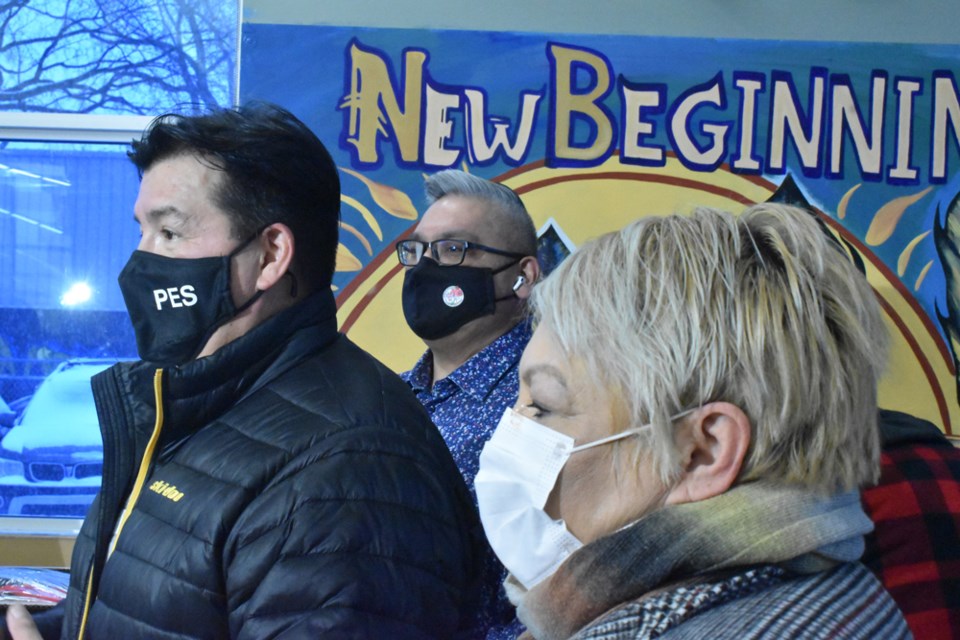SASKATOON — Federation of Sovereign Indigenous Nations Chief Bobby Cameron and First Vice Chief David Pratt are both hoping Pope Francis will finally issue a public apology on the atrocities committed by Catholic religious figures against Indigenous Peoples, most especially during the residential school system.
A Canadian delegation composed of representatives from the Assembly of First Nations, Inuit Tapiriit Kanatami, Métis National Council and several members of the Canadian Conference of Catholic Bishops were scheduled to meet Pope Francis next week in the Vatican but decided last Tuesday to postpone the trip due to health concerns caused by the pandemic.
Cameron and Pratt welcomed the Vatican’s gesture of meeting representatives of several Indigenous organizations in the country, but are also mindful that work still needs to be done on the path to healing and reconciliation.
“For First Nations and Indigenous Peoples, we’re thankful for sure, but there’s still a lot of healing that needs to be done. There still has to be answers that need to be given to our survivors and there has to be some action items, true reconciliation action items,” Cameron said.
“An apology is just a part of it. I’m talking about the real action afterwards. Like addressing systemic racism, compensation, and releasing all those records for the survivors.”
He added that true justice must also be offered to the victims and survivors of the abuses.
“Holding those people accountable. All those murderers and rapists back in the day who were priests and nuns, some of them are still living and they cannot get away with the horrible crimes they committed. Justice has to be served.”
Cameron also believes that the delay is an advantage to the Canadian delegation.
“We’ll just wait for a new date. It also gives the delegates more time to prepare a united message when they actually meet the pope,” said Cameron. “And they would say to the pope, ‘there’s still unfinished business.’ Many people still need to heal. Help our survivors and their families to heal.”
Pratt added that Indigenous Peoples have been waiting for an apology, which was stated in the Truth and Reconciliation Commission’s Call to Action # 58.
The call states: "We call upon the pope to issue an apology to survivors, their families, and communities for the Roman Catholic Church’s role in the spiritual, cultural, emotional, physical, and sexual abuse of First Nations, Inuit, and Métis children in Catholic-run schools. We call for that apology to be similar to the 2010 apology issue to Irish victims of abuse and to occur within one year of the issuing of this report and to be delivered by the pope in Canada."
The TRC final report came out in 2015 offering 94 calls to action for healing and reconciliation. Pope Francis was already the head of the Catholic Church when the TRC completed its report, but has yet to issue an apology.
“At the very least we want them to honor their commitment they need based on the TRC which was having a healing fund. I believe they committed $28 or $30 million to the healing fund. We're calling on them to keep that commitment to support our survivors who are all moving forward to their path of healing. An apology would be great; we're working on that. But there are a number of things that we’re working on with them and we’re hopeful of the outcome,” said Pratt.
“Also, in terms of the papal bull and the doctrine of discovery, which basically gave the Catholic Church and the European colonizers the green light to do everything that they've done to indigenous people around the world. So, a lot of work needs to be done for getting those conversations started and we’re going to continue to support our people. We know [the Catholic Church] is an institution that’s already thousands of years in operation.”
Pratt added that Cameron has chosen former Okanese First Nation Chief Marie-Ann Day Walker Pelletier to represent them in the meeting with Pope Francis, which is expected to be rescheduled in early 2022.
“They are finalizing the trip. We’re following this closely and we will be there to support her as she joins the delegation and speak on behalf of our region. We are looking forward for that meeting and getting a conversation started with the pope.”
The meeting was set from Dec. 17 to 20 in the Vatican where Pope Francis is scheduled to have separate private meetings with representatives from the three National Indigenous Organizations, Indigenous Elders, Knowledge Keepers, residential school survivors, and the youth.
The recent news of the Omicron variant of coronavirus spreading in the nearby United States and to other countries was the risk that the Canadian delegates don’t want to take since there are a number of elderly members of their group.
“Particularly for many elderly delegates as well as those who live in remote communities, the risk of infection and the fluid nature of the evolving global situation presents too great a threat at this time We take comfort in the desire, conveyed to us by the Holy See, that the safety of the delegation should inform any decision to move forward. It is also important to note that the delegation is postponed not cancelled,” the joint statement of the delegation said.
“Currently, the world's health experts are still learning about the transmissibility of the Omicron variant. As more information becomes available, we will continue to assess the feasibility of future travel plans, based on guidance from the Canadian government and relevant international authorities.”





